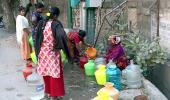Karnataka Deputy Chief Minister D K Shivakumar asserted on Monday there is no question of releasing Cauvery river water to Tamil Nadu at any cost now.

Amid criticism and protests against the government over allegations that Cauvery water was being released from Krishnaraja Sagar (KRS) dam to Tamil Nadu, he clarified that the discharge was meant for Bengaluru, and not for the neighbouring state.
"There is no question of releasing Cauvery river water to Tamil Nadu now at any cost, we have not left (released)....How much water flows to Tamil Nadu, there is an account for it. Even if water is released today, it will take four days to reach there," Shivakumar, who is also the water resources minister, told reporters here.
"We are not fools in this government to release water (to Tamil Nadu)," added Shivakumar, also the State Congress chief
The 'Raitha Hitarakshana Samiti' had staged a protest in the district headquarters town of Mandya on Sunday alleging that water was being released from KRS dam to Tamil Nadu, amid drought and water crisis in many parts of the state.
The Bharatiya Janata Party too had attacked the Congress government alleging that it was keen to protect the interests of the Dravida Munnetra Kazhagam, the party's alliance partner in Tamil Nadu, at the cost of Karnataka's farmers and citizens, as it targeted the Siddaramaiah administration for allegedly releasing water from Cauvery river to Tamil Nadu
Shivakumar clarified that some water was discharged from KRS dam to replenish the Shiva Balancing Reservoir at Malavalli from where it is pumped to Bengaluru.
"From where we pump water to Bengaluru, the water level there was less. Water has to be at a certain level for it to be pumped, so as to maintain that level the water was released...for Bengaluru's water, it was done," he said.
Amid the acute water shortage in Bengaluru, Shivakumar said the state had not witnessed such a severe drought in the past three-four decades, and the next two months are 'very much important'.
The administration is making all efforts to manage the crisis and supply water to the citizens, he said, adding, steps have been taken to control the water 'mafia' in Bengaluru.
"In the last 30-40 years we had not seen such drought; though there was drought earlier we had never declared such a large number of taluks as drought-affected," Shivakumar told reporters in Bengaluru.
Shivakumar, also in-charge of Bengaluru development, said wherever Cauvery river water has to be supplied in the city, it is being done, but out of 13,900-odd borewells in Bengaluru, about 6,900 have become defunct.
"So to control the situation, we have arranged for tankers to supply water. Bruhat Bengaluru Mahanagara Palike (BBMP) and Bangalore Water Supply and Sewerage Board (BWSSB) are making all efforts in this regard," he added.
Karnataka has declared drought in 223 out of 240 taluks, out of which 196 are categorised as severely drought affected.
Alleging that the opposition (BJP-JD(S) combine) was trying to indulge in politics over the issue, Shivakumar said the administration has on its part made efforts to control the water 'mafia', and provide water by taking it from private borewells, and also rates have been fixed based on distance travelled by the water tankers.
"A separate online system has been brought in for this and officials have been appointed to oversee this," he added.
Stating that the next two months are 'very much important', Shivakumar, who is also the Water Resources Minister, said priority is to ensure that there is no wastage of water.
"(By implementing) Cauvery fifth stage (project) -- we will make all efforts to provide Cauvery water to 110 villages (around Bengaluru) at the earliest by May last week," he said.
To control the water 'mafia', more than 1,500 private water tankers have registered so far and time has been extended for others also to register till March 15, Shivakumar further said.
Police, Regional Transport Office (RTO), BBMP and BWSSB will monitor it and there will be a board with registration number on tankers.
"Operating illegally and charging exorbitantly Rs 5,000 or 6,000 (per tanker of water), such things are going on. To control, its price has been fixed based on the distance travelled," he noted.
In Bengaluru, Ramanagara, Magadi, Doddaballapura, Hoskote and surrounding areas, there are irrigation borewells, he said, adding that 'we have taken a count of them, to draw water from there if an emergency situation arises'.
Meanwhile, the civic water board has warned of initiating legal action against those drilling unauthorised borewells in Bengaluru, in yet another measure aimed at tiding over the situation.
The move comes days after the BWSSB banned the usage of potable water for non-essential purposes, including cleaning vehicles.
In its latest order, the BWSSB said that starting March 15, people have to seek permission for drilling borewells by submitting their applications on its official website. Approval will be granted based on site inspection by the concerned officials, it said.
The BWSSB said in an order that before drilling borewells for personal or other use in Bengaluru city, it is mandatory to obtain permission from concerned authorities as per section 11 of Karnataka Ground Water (Regulation and Control of Development and Management) Act, 2011.
It cited lack of adequate rainwater as a reason for decline in ground water level and said many borewells in the city have dried up.
Officials also suspect that ground water level in the city is also decreasing due to "unscientific drilling" of borewells.
According to the order, borewells should be drilled only in those places where permission has been granted by the concerned authorities and if they are done in unauthorised places, legal action will be taken as per rules.
The order comes just days after the BWSSB banned usage of potable water for non-essential purposes -- cleaning vehicles, construction of buildings and roads, for entertainment purposes or decorations like fountains--in the city and stated that violators would be fined Rs 5,000.
Malls and cinema halls are permitted to use potable water only for drinking, according to the March 7 order.











 © 2025
© 2025